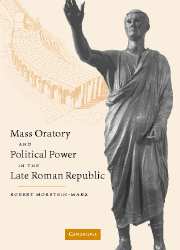Book contents
- Front Matter
- Contents
- List of figures and maps
- Acknowledgments
- Note on translations
- List of abbreviations
- 1 Introduction
- 2 Setting the stage
- 3 Civic knowledge
- 4 The Voice of the People
- 5 Debate
- 6 Contional ideology: the invisible “optimate”
- 7 Contional ideology: the political drama
- 8 Conclusion
- References
- Index
8 - Conclusion
Published online by Cambridge University Press: 22 September 2009
- Front Matter
- Contents
- List of figures and maps
- Acknowledgments
- Note on translations
- List of abbreviations
- 1 Introduction
- 2 Setting the stage
- 3 Civic knowledge
- 4 The Voice of the People
- 5 Debate
- 6 Contional ideology: the invisible “optimate”
- 7 Contional ideology: the political drama
- 8 Conclusion
- References
- Index
Summary
Roiled by waves of unrest in the last century of its life, the Roman Republic continually fell into bloody spasms of political violence. Economic distress, prolonged military service, controversies over land redistribution, exclusion from full civic participation, and the savage dispossessions of civil war made the Italian countryside a persistent breeding ground for discontent. The city of Rome, now housing in cramped, unsanitary conditions perhaps a million souls – an enormous population under pre-modern conditions – depended on the agricultural surplus of far-flung lands; its population hung perilously close to the brink of starvation and was apt to panic when poor harvests or disruption of the grain routes caused periodic interruptions in the food supply. Violence and persistent political disruption in the absence of effective institutions for maintaining order made the city ungovernable for extended periods in the 50s; three years in that decade opened without consuls because it had proven impossible to hold elections. The long-suffering soldiery saw its hopes for compensation upon demobilization persistently dashed by a recalcitrant Senate, and looked to its victorious generals to realize them by whatever methods would serve. It seems extraordinary not that the Roman Republic fell (if that is the right word) when it did, but that it survived so long.
Yet the traditional political system maintained the allegiance of its citizens right down at least to the Caesarian civil war, and arguably much further.
- Type
- Chapter
- Information
- Mass Oratory and Political Power in the Late Roman Republic , pp. 279 - 287Publisher: Cambridge University PressPrint publication year: 2004



